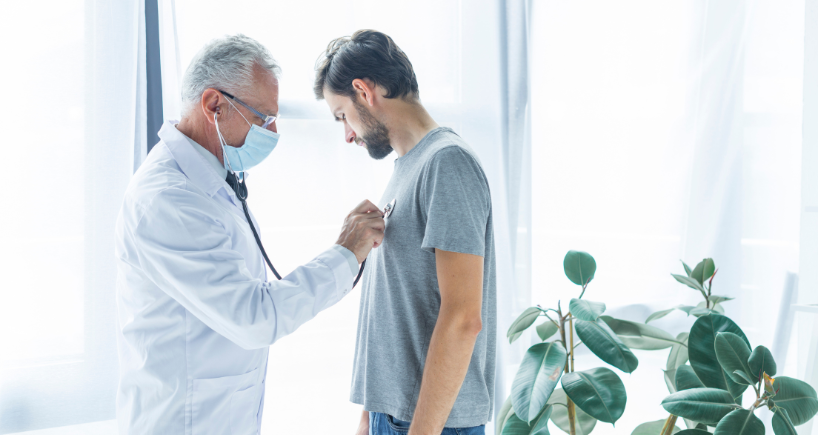
Cardiomyopathy – Symptoms, Causes, and Treatment
Cardiomyopathy affects the muscles of your heart and makes it more difficult to pump blood effectively. Certain conditions cause disruptions in the heartbeat. Arrhythmias can occasionally result from it. Nevertheless, it is treatable despite its hazards. This blog discusses cardiomyopathy, including its symptoms, causes, and treatments.
Cardiomyopathy
It is a condition that affects your myocardium, which is a heart muscle. It makes your heart stiff, enlarged, and thick and causes scar tissue. As a result, the heart cannot pump blood effectively and sufficiently and supply it to all parts of the body.
There are mainly four types of cardiomyopathy:
- Hypertrophic cardiomyopathy: It is a complex type of heart disease affecting your heart muscles. It causes thickening of ventricles and lower heart chambers, stiffness of ventricles, cellular changes, and mitral valve changes. It affects your body by thickening the myocardium, which commonly occurs at the septum, a muscular wall separating the heart’s left and right sides. The thickened septum causes the narrowing of blood vessels and reduces the blood flow from the left ventricle to the aorta. This makes it difficult for the heart to pump blood and supply it to all regions. The symptoms of this condition include chest pain, shortness of breath, and dizziness.
- Restrictive cardiomyopathy: It is a type where the muscle tissues in the lower chambers of the heart become stiff, and ventricles cannot store or fill blood, leading to reduced blood flow.
- Dilated cardiomyopathy: It is a type which is caused when the left ventricle of the heart muscle gets enlarged. It results in the thinning of tissues, causing them to pump with less force. As a result, more blood remains in the heart after each pump, making it difficult to supply blood to all parts of the body.
- Arrhythmogenic right ventricular dysplasia: It is a rare type where the fibrous tissue or fat replaces a damaged heart muscle in the right ventricle. As a result, the right ventricle stretches out and becomes thin, causing it to lose its ability to pump blood.
Symptoms of cardiomyopathy
There are various symptoms of cardiomyopathy. They include:
- Fatigue
- Heart palpitations
- Chest pain
- Shortness of breath
- Irregular heartbeats,
- Swelling of legs and ankles
- Shoulder pain
- Syncope
- Bloating of the stomach
- Cough while lying down
- Trouble lying flat to sleep
- Dizziness
Causes of cardiomyopathy
There are two main causes of cardiomyopathy:
- Inherited cause: Cardiomyopathy is seen due to genetic factors that are inherited from parents to children.
- Acquired cause: Cardiomyopathy is developed due to other health conditions or disorders affecting your heart. For instance, coronary artery disease, heart attacks, arrhythmia, and infections of the heart muscle lead to cardiomyopathy.
Treatment of cardiomyopathy
Cardiomyopathy cannot be permanently cured, but several ways exist to manage the symptoms and slow the disease’s progression. Some of the treatments include:
Medications: Based on the causes, types, and symptoms, healthcare professionals prescribe certain medications to reduce the risk of this condition and improve your blood flow. They include antihypertensives, anticoagulants, corticosteroids, antiarrhythmics, antihyperlipidemic drugs, and aldosterone antagonists.
Lifestyle management: By managing and changing your lifestyle habits, you can reduce the risk of cardiomyopathy. Some of the adjustments include:
- Eating healthy food that involves fruits, vegetables, proteins, fibres, and vitamins
- Doing regular exercises
- Reducing stress level
- Getting enough sleep and rest
- Avoiding alcohol, smoking, and tobacco
Surgical implanting devices: These are the devices implanted into your body that treat certain symptoms of cardiomyopathy. It treats irregular heartbeats, increases blood flow, and prevents the narrowing of blood vessels. Some of the devices are,
- Pacemakers
- Implantable cardioverter defibrillators
- Left ventricular assist device
- Cardiac resynchronisation device
Surgery: For certain conditions, surgeries are carried out, like bypass surgery, valve surgery, septal myectomy, and heart transplant. All these procedures involve removing heart tissues affected or damaged to improve blood flow through the heart.
Conclusion
To conclude, cardiomyopathy is a progressive, potentially fatal condition affecting your heart muscle. The heart muscle becomes weaker and loses its ability to pump blood efficiently. It may be caused by an inherited genetic trait or by any number of medical disorders. Treatments are available to manage the symptoms and reduce the risk of the condition. Treatment aims to prevent further damage and loss of function of your heart.



















